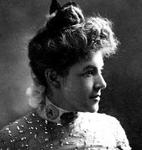Biography

Ella Wheeler Wilcox, whilst perhaps not being one of America's greatest poets, was in her time one of the most popular, her verse appearing in innumerable magazines and periodicals as well as a number of books. She has probably been read by many more people than poets who have been considered her superiors. Whilst not all her poems are, of course, New Thought in outlook, in one of her books, Poems of Power, a dozen or more of her poems may be discerned typical of New Thought ideas and emphases.
However, it was probably as regular contributor to newspapers that Ella Wheeler Wilcox reached her widest public, for she wrote syndicated articles for the Hearst newspapers. Many of these were simply expositions of the central teachings of New Thought, though not definitely linked with that minority point of view. Thus New Thought ideas found an outlet to the public they could never have gotten through specifically New Thought channels. Many of these ideas commended themselves to the minds of readers which might well have been closed by denominational prejudices, had they come labeled as New Thought.
Ella was born November 5, 1850, in the village of Johnstown, Rock County, Wisconsin. Her parents were Marcus H. Wheeler, and Sarah Pratt Wheeler, with three older children they had followed, "Grandsir Pratt" from Vermont in 1849.
In the spring of 1852 the Wheeler family settled in Dane County, Wisconsin in the town of Westport, where Ella grew up, in the home where she made her reputation as a writer of appealing poetry, until her marriage in 1884, when she went to Connecticut; from which state her Grandfather Wheeler had migrated to Vermont years before.
With a Great Grandfather Pratt seven years in the Revolutionary War, and his wife Elizabeth Currier of French blood; a Grandmother named Conner; a Mother, who, like most of her aunts and cousins, was addicted to the habit of composing verses, Ella had the inherited tendency; a regular family study of Shakespeare, Byron, Burns and modern poets all year round, 1849-50 doubtless added a prenatal influence, which formed the character of her ambition.
Her education was acquired in a district school, now named Ella Wheeler Wilcox School, except one short term at Wisconsin University, which was as she saw it a "waste of time."
Riding horseback, dancing, visiting girl friends, dreaming great dreams and being kind, was better than trying to master mathematics, of which she had a "holy horror."
In the years between 1865 and 1875, a strong prohibition wave was sweeping over Wisconsin. Good Tempar Lodges became numerous. Many of Ella Wheeler's earlier verses were in support of total abstinence and in opposition to booze, its makers, and its venders. Fifty-six of these were published in a volume entitled "Drops of Water." Her volume entitled "Shells" contained 119 poems--more than 175 poems and the author not 23 years old. It is doubtful if anyone knows the names of all her published poems. They were a great multitude and everyone found ardent admirers--and critics.
Ella Wheeler Wilcox wrote verses which appealed to the public and never one verse strained or ungramatical, as she states in her memoirs, her first check paid for a dress to wear to a wedding, in March 1869. Her financial returns were not of importance until after 1880, though she was known and loved by thousands of readers. She wrote for the same reason that a bird sings. It was what she was made for. Her marriage in 1884 was a love match. The death of Mr. Wilcox overwhelmed her, until satisfied that she had received messages from him through her practice of Spiritualism. Then she resumed literary work, and other activities; including war work in France up to Armistice Day.
Whilst Mrs. Wilcox was certainly New Thought in her general outlook, and in common with many who later became leaders of the New Thought movement, attended classes by the "teacher of teachers," Emma Curtis Hopkins , she went much farther than many of the leaders of the movement in her espousal also of ideas which are regarded as occult. And some of the leaders were not always happy with what she wrote. She was strongly drawn to Spiritualism and gave much credit to Oriental--especially Indian thought, as the source of many of her ideas.
She wrote not only poetry; but did a great deal of prose writing as well. A number of her essays specifically on New Thought themes appeared in a volume entitled The Heart of New Thought, which the publisher's preface described as a "Noteworthy interpretation of New Thought, the backbone of which philosophy is the Power of Right Thought....Mrs. Wilcox is ever the voice of the people: what she says is practical, what she thinks is clear, what she feels is plain."
She died on October 30, 1919, at her home in Short Beach, Conn.
Poetry
The Invisible Helpers in Cosmopolitan 57 (October 1914): 578-579
The Voice of the Voiceless
Disarmament
Roads to God
To An Astrologer
Secret Thoughts
An Ambitious Man
An Englishman and Other Poems
Hello, Boys!
The Kingdom of Love
Maurine and other Poems
New Thought Pastels
Poems of Cheer
Poems of Experience
Poems of Optimism
Poems of Passion
Poems of Power
Poems of Progress
Poems of Purpose
Poems of Sentiment
A Woman of the World
Yesterday
Poems of Reflection, 1905 copyright, M. A. Donahue & Co. (publisher)
Last updated July 06, 2011



